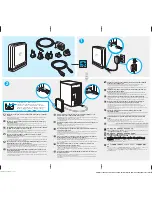
The OneCommand Utility User Manual
Page 135
Boot Types
Using the Maintenance tab, you can enable, disable or configure boot from SAN for x86 BootBIOS,
EFIBoot and OpenBoot (also know as FCode).
•
x86 BootBIOS works with the existing BIOS on x64 and x86 systems.
•
OpenBoot (FCode) works with the existing system BIOS on Solaris SPARC systems using the
SFS driver and on Linux PowerPC systems. OpenBoot is also called FCode.
•
EFIBoot works with Intel Itanium 64-bit and x64-based systems and provides 64-bit system boot
capability through the use of the EFI (Extensible Firmware Interface) Shell.
Emulex provides Universal Boot and Pair Boot code images that contain multiple types of boot code.
These images provide multi-platform support for boot from SAN. Universal Boot and Pair Boot
transparently determine your system platform type and automatically execute the proper boot code
image in the adapter. These code images reside in adapter flash memory, allowing easier adapter
portability and configuration between servers.
The configuration regions on the adapter store the configuration data for each of these boot types.
Boot Device Parameters
The boot LUN for all three boot types is in the range of 0-255. EFIBoot and OpenBoot (FCode) also
support an 8-byte LUN, which you can use instead of the single-byte LUN. You must select which LUN
type to configure.
•
For OpenBoot, you must also provide a Target ID parameter.
•
The OneCommand Manager application runs on a running OS, so you must boot the host to
configure boot from SAN with the OneCommand Manager application.
•
You must work from a running host that supports the OneCommand Manager application. Often,
this host has booted from a direct-attached drive. With the OneCommand Manager application,
you can configure a direct boot host to boot from a SAN. You can modify an existing boot from
SAN configuration or configure boot from SAN on an adapter for installation in another host so it
can boot from SAN.
•
You must know what boot code type the adapter has; the OneCommand Manager application
cannot detect this. Without knowing this, you could configure a boot type but not be able to boot
from it since the adapter lacks the correct boot code.
•
You must know what boot code type the system supports; the OneCommand Manager
application cannot detect this. You can configure any boot type, but if the system does not
support that type, it cannot boot from SAN.
Note: x86 and OpenBoot share the same configuration memory space. You cannot
configure an adapter for both x86 and OpenBoot at the same time. If you try, a
message appears that the existing boot type configuration will be overwritten by the
new configuration.
Note: Boot from SAN configuration does not affect current system operation. The changes
only take effect upon reboot if you have configured it correctly.
















































